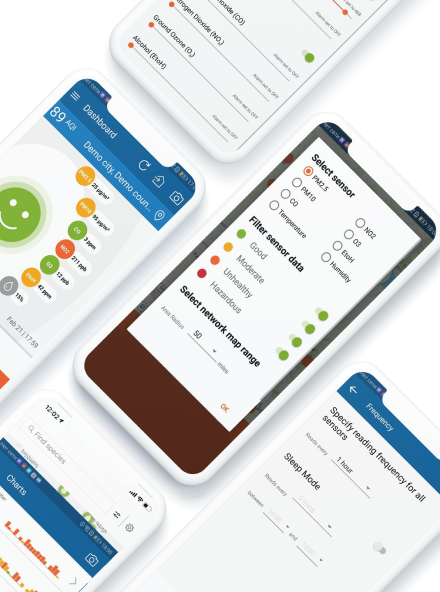
Microsoft Azure vs. AWS vs. Google Cloud: Which One to Choose?
6 Apr 2023

It goes without saying that cloud computing is here to stay. The battle now is between the many different cloud platforms. The current “nominees” for cloud dominance are AWS, Microsoft Azure, and Google Cloud.
Which one is the right choice for your business though?
Many companies rush into cloud transformation head-first by choosing the cheapest provider. While this might sound reasonable at first, especially for businesses on a tight budget, for a more efficient choice you need to base your decision on several other equally important criteria.
Cheap is not always good. You want to have a reliable cloud system that serves your business in the long run. And when it comes to pricing, it’s better to choose a platform that offers flexible payment options, rather than one that offers the cheapest fixed price.
Back to our top three providers - if you have singled out AWS, Azure, and Google Cloud, and find it hard to make the final choice, we might be of some help to you at this point in your cloud adoption journey.
All of these three providers come with multiple services that offer great features and functionalities together with different pricing options. They are not making things easy for you, are they? Worry not - we have gathered some insightful data that displays their similarities and differences, and stresses the features that make each one stand out from the rest. This will highly ease the selection process for you by helping you understand which of them suits your company’s cloud needs and demands the best.
A Brief Backstory
Let’s first give you some quick historical overview on each of these three platforms.
Microsoft Azure
Initially called Windows Azure, Microsoft Azure was first introduced in 2008, however, it was not until 2010 that it became commercially available. That’s when the platform expanded its scope of services and set out on its journey to becoming one of the most demanded cloud platforms in the market. Starting with only a limited set of services, over time Azure came up with open-source software packages, as well as with solutions for big data, IoT, ML, and AI.
AWS
Amazon Web Services or AWS was established in 2006 with the launch of the Amazon Simple Queue Service (Amazon SQS). Being the main pioneer in cloud computing, AWS has come a long way since then and boasts an annual growth rate of around 30%. With more than 200 fully featured services, AWS covers all aspects of modern technology, from AI, machine learning and IoT to compute and storage.
Google Cloud
Google Cloud was launched in 2008 under the name App Engine as a private preview for developers. At first, it was available to 10,000 users only, but within a month the user base hit 75,000, with 80,000 more on the waitlist. That was when Google made the service available to everyone. By 2009, new paid services were added to the platform, though it was only in 2011 that Google decided to take the “preview” label down.
In May 2010, Google introduced its second major cloud service, Cloud Storage, thus making its debut in the IaaS market. Google Cloud has since managed to become a global player in the cloud market and a worthy competitor of both Azure and AWS.
Pricing
The costs differ from platform to platform, however, each offers a range of flexible pricing models to meet the needs of any customer.
It should be noted that all three platforms offer the pay-as-you-go pricing model which means that you pay only for the services that you use without any upfront costs, long-term contracts, or termination fees. There might be some differences in the costs depending on the specific services, discount plans, and even the regions that you choose. It all comes down to your needs and the usage patterns of your workload.
We should also not forget the free trial options that our triad of cloud platforms offers, with free tier and trial accounts that let you try their services free for a limited period of time or use a specific amount of resources for free long-term.
Now let’s have a closer look at some other pricing options that AWS, Azure, and Google Cloud bring to the table.
Microsoft Azure
Azure’s pricing models include the following:
- Azure Hybrid Benefit: If you have an existing on-premises license for Microsoft software (Windows Server or SQL Server), then this pricing model is what you need. It allows you to save up to 40% on the cost of running Azure virtual machines by applying your licenses to them.
- Reserved Instances: This model allows you to reserve Azure resources beforehand for a year or for three years and get a 72% discount.
- Enterprise Agreements: Large-scale organizations looking to implement Azure services long-term should go with this model to get high discounts, flexible payment conditions, as well as access to support and additional services.
- Azure Spot Virtual Machines: This model allows you to bid on the unused Azure compute capacity, and if your bid is accepted, you will get an essential amount of discounts. The discount rate depends on the current demand on the unused compute capacity. If the demand increases, Azure has the right to reclaim the capacity without notice. Don’t go for this model if your workload depends on consistent, high-performance compute resources that function without interruptions.

AWS
The main pricing models of AWS are as follows:
- On-Demand Instances: Despite being similar to the pay-as-you-go model, this payment option is specific to the AWS pricing system. With this model, you pay for compute capacity by the hour or second. No need for advance payments or long-term contracts.
- Reserved Instances: As with Azure, AWS also allows you to reserve instances for specific periods and receive a 75% discount.
- Saving Plans: Through the Savings Plans you can get up to 72% discount, provided you commit to use compute services from 1 to 3 years.
- Dedicated Hosts: With this model you get a physical server with full control over the underlying hardware.
- Spot Instances: Choosing this pricing option, you can get high discounts on unused EC2 instances capacity via bidding.
Google Cloud
Google Cloud offers the following pricing options:
- Preemptible Virtual Machines: This pricing model is appropriate for workloads that won’t suffer any harm because of interruptions, such as batch processing or testing. It offers lower prices for Compute Engine virtual machine instances on the condition that the instances can be reclaimed at any time.
- Committed Use Discounts: If you can commit to use certain services for a one-year or three-year period, then this model will provide you with up to 57% discount.
- Sustained Use Discounts: Depending on the amount of time you use virtual machine instances in a month, you can get up to 30% discount with this model using Google Cloud’s services.
Availability Regions
All three platforms have long gone global and are available in multiple regions around the world. The latest numbers on the availability regions of each platform are as follows:
- Microsoft Azure is available in over 60 regions and 140 countries.
- AWS comes with 99 availability zones and 31 geographic regions.
- Google Cloud provides availability in around 20 countries and 35 locations.
Checking the availability of a cloud platform in your region beforehand is of crucial importance since it will help you avoid issues with compliance regulations and latency in the future.
Reliability
Names and numbers aside, it’s important to have an idea on the essence and reliability of each platform in simpler words. Have a look at our infographic below to see what these three platforms have to offer to reassure their users in their security and reliability. It’s a no-brainer that reliability is one of the key criteria to consider when looking for a cloud provider since the latter is going to handle your business’ sensitive data. While all the three platforms offer reliability and robust security, you need to understand the focal points of each in order to make the right decision.

Services
All three cloud platforms offer a wide array of services, including compute, storage, databases, analytics, machine learning, and more. AWS has the most extensive range of services, followed by Microsoft Azure and Google Cloud. Below is a more detailed overview of the services offered by these platforms.

AWS and Azure, as of latest, list more than 200 products and services to cover the cloud computing needs of businesses of any scale. Google Cloud is still catching up with over 100 services listed so far.
Security and Privacy
Each platform provides its users with a holistic security system and robust tools to ensure data privacy and safety. The main security measures that all three have in place are the following:
- Data encryption which prevents unauthorized access to sensitive data.
- Identity and Access Management (IAM) which allows you to decide who can access your resources and data.
- Network security features, such as firewalls and VPNs.
- All three providers follow the well-established industry standards and regulations: PCI DSS, HIPAA, and GDPR.
- Monitoring and logging services to help you track your data and infrastructure and detect possible threats or vulnerabilities.
- Incident response plans to quickly mitigate possible security breaches.
Additionally, each provider has other security measures specific to its platform. For example, when you start an instance in AWS, the networking access is automatically defaulted to off.
Azure, on the other hand, has a cloud defender feature powered by AI that detects the faults and flaws in your cloud configurations, improves your security, and better protects your cloud environments from cyber-attacks.
As for Google Cloud, it also has a say here with its Identity-Aware Proxy (IAP) feature which ensures a secure authentication and authorization of all requests to App Engine or Cloud Load Balancing.
Keep in mind that the security measures and tools of any of these platforms will be of no use if your company lacks its own security system and is vulnerable to cyber attacks.
So, Which One Should You Choose?
As already mentioned before, the final decision comes down to your company’s specific needs, your existing software, the type of workload, etc. However, there are a few telltale signs that might help you in your decision:
- If your business relies on a lot of Microsoft software and runs on Windows, Azure might be the way to go.
- If you are a startup on a low budget, you may want to look into what Google Cloud has to offer.
- And finally, if you run a large-scale organization that needs a provider with a breadth of services and products, as well as global reach, AWS might be what you need.
Parting Thoughts
At VOLO, we have been helping companies of various sizes handle their cloud computing needs safely and painlessly for over a decade. If you are overwhelmed by the amount of different services and pricing options that AWS, Azure, and Google Cloud offer, our team would be more than happy to help you make the right and most efficient decision for your business.



